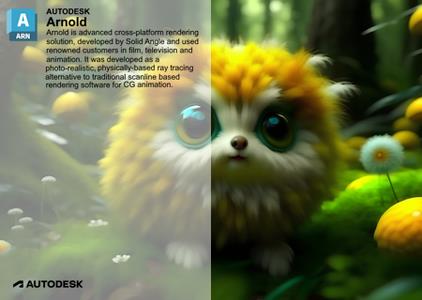
Free Download Solid Angle Maya to Arnold 5.4.1 | 4.0 Gb
Solid Angle, a bussines Autodesk, is pleased to announce the availability of Arnold (or MtoA) 5.4.1 for Autodesk Maya. This released introduces Arnold 7.3.1.0.
Owner:Solid Angle
Product Name:Maya to Arnold
Version:5.4.1
Supported Architectures:x64
Website Home Page :www.autodesk.com
Languages Supported:english
System Requirements:Windows, macOs & Linux *
Size:4.0 Gb
Enhancements
–Denoising by default with Intel Open Image Denoise (OIDN):The Intel Open Image Denoiser imager is now added by default to new scenes (MTOA-1787)
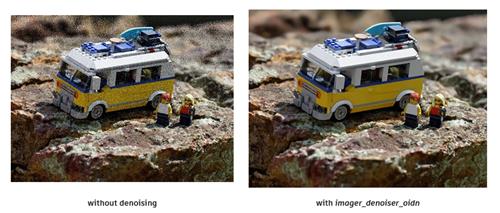
–Improvements to the Arnold Render View Snapshots:The snapshot workflow and interface in the Arnold RenderView has multiple enhancements and behaviours.
. Press the S hotkey in the Arnold RenderView to save a snapshot.
. Improved UI for Snapshot buttons (ARNOLD-232)
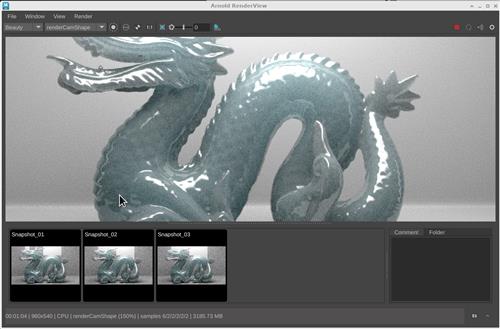
You can now compare snapshots of the same resolution using the Ctrl key modifier when selecting a second snapshot
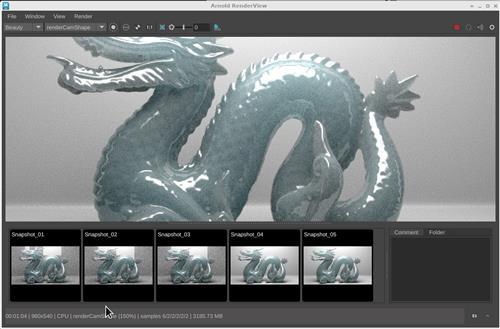
You can now select multiple snapshots with the Shift modifer and delete multiple selected snapshots with the Del key
–OSL Enum support in Attribute Editor :Shader parameters of type ENUM on the OSL code node create a combo box with the available options (MTOA-1781)
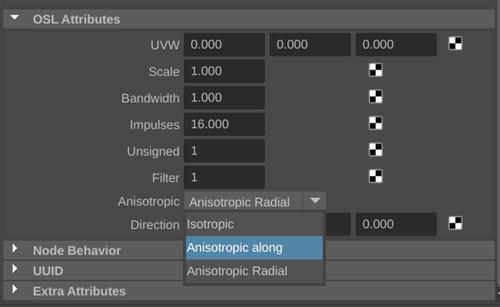
OSL enum parameter values displayed as a drop-down list
–New presets added to aiRampRgb :We have added over 100 presets to the aiRampRGB node (MTOA-1630)
–aiStandardVolume assigned on creation of new aiVolume node :When creating a new aiVolume node a new aiStandardVolume shader will be created and assigned to the new node (MTOA-1803)
–Update Intel Open Image Denoise (OIDN) to version 2.2.2:The updated denoiser has 10% better performance on CPU, includes some critical bug fixes, and handles high-frequency details better. (ARNOLD-14772)
–OptiX denoiser runs on progressive negative AA passes:The OptiX denoiser imager now denoises the low-resolution progressive passes (renders with AA < 0). This should result in higher quality feedback in IPR. (ARNOLD-11487)
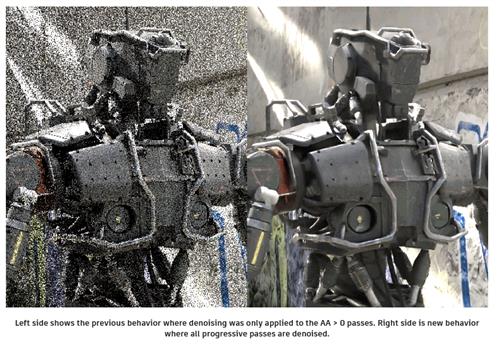
–MaterialX node definitions:The MaterialX node definitions for Arnold shaders now use the standard surfaceshader and volumeshader types, which make them easier to use in DCCs and mix with standard library shaders. The UI for Arnold MaterialX shaders is also improved with the addition of parameter groups and node categories. (ARNOLD-14717, ARNOLD-14736, ARNOLD-14716)
–OCIO environment variable priority:The OCIO environment variable now takes priority over the configuration file set in the Arnold OCIO color manager as well as the builtin OCIO configuration file. A new ignore_environment_variable parameter on the OCIO color manager causes Arnold to ignore the value of the environment variable and restores the previous behavior. The OCIO environment variable is also now taken into account by maketx. (ARNOLD-9012)
–Curves in procedural viewport API:Procedurals now return curves nodes in AI_PROC_POLYGONS viewport mode. This is an API change only. MtoA does not yet use this API for displaying curves in the viewport. (ARNOLD-14756)
USD Enhancements
– Improved support for USD cameras (MTOA-1597)
. Cameras from a USD Stage are displayed in the Render View Camera list
. You can use UFE camera paths when rendering in batch
. USD Stage cameras are listed in the Render Settings if they are set to the "default" or "render" purpose.
–Light linking on custom procedurals:You can now use light linking on custom procedurals such as Yeti in the render delegate. (usd#1730)
–Improved tooltips:The tooltips in DCCs for Arnold nodes in USD is much improved. usd#1835
–Imager node support:USD support for the new Arnold AI_NODE_IMAGER node type. usd#1870
–Export ArnoldOptions as UsdRenderSettings– The Arnold USD exporter covnerts the Arnold options node to UsdRenderSettings, UsdRenderProduct, and UsdRenderVar nodes. usd#1852, usd#1865
–Velocities motion blur for points– Points with a velocities attribute now render with motion blur. usd#1868
–Better default for transmission ray depth– Set the default transmission depth to 8, so that the default settings work better with glass, and to match default in other Arnold plugins like HtoA and MtoA. usd#1889
API changes
–Imager plugin API:A public API is now available for imagers. This adds support for custom and third-party imagers in Arnold. (ARNOLD-10322)
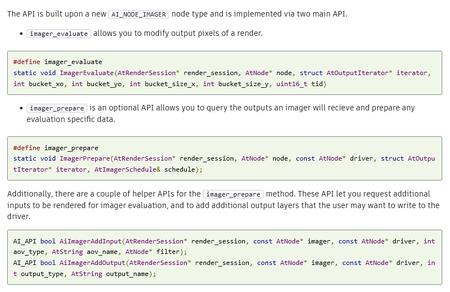
xSolid Angle Maya to Arnold 5.4.1
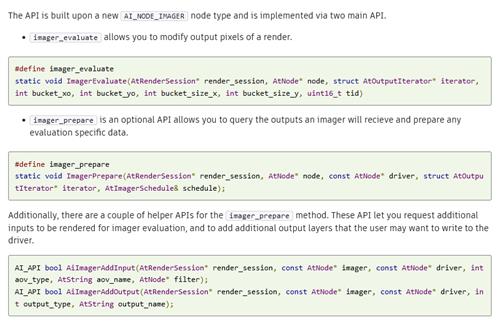
Close
–Improved builtin metadata:Node and node parameter definitions have been further augmented with metadata that could be useful across DCCs. The metadata that have been added or improved are the following: help, category, ui.groups. Some of these metadata were previously distributed as separate mtd files in each DCC. (ARNOLD-14677, ARNOLD-14678, ARNOLD-14702, ARNOLD-14661)
USD Enhancements
–Light linking on custom procedurals:You can now use light linking on custom procedurals such as Yeti in the render delegate. (usd#1730)
–Improved tooltips:The tooltips in DCCs for Arnold nodes in USD is much improved. usd#1835
–Imager node support:USD support for the new Arnold AI_NODE_IMAGER node type. usd#1870
–Export ArnoldOptions as UsdRenderSettings– The Arnold USD exporter covnerts the Arnold options node to UsdRenderSettings, UsdRenderProduct, and UsdRenderVar nodes. usd#1852, usd#1865
–Velocities motion blur for points– Points with a velocities attribute now render with motion blur. usd#1868
–Better default for transmission ray depth– Set the default transmission depth to 8, so that the default settings work better with glass, and to match default in other Arnold plugins like HtoA and MtoA. usd#1889
Incompatible Changes
–OCIO environment variable priority:The OCIO environment variable now takes priority over the file set in the Arnold OCIO color manager. Setting color_manager_ocio.ignore_environment_variable to true restores the previous behavior.
Bug Fixes
peeplink.in/54c4c85cc3b3
Arnoldis an advanced cross-platform rendering solution, developed by Solid Angle and used by renowned customers in film, television and animation. It was developed as a photo-realistic, physically-based ray tracing alternative to traditional scanline based rendering software for CG animation. Arnold uses cutting-edge algorithms that make the most effective use of your computer’s hardware resources and was designed to easily adapt to existing pipelines. It is built on top of a pluggable node system, so users can extend and customize the system by writing new shaders, cameras, filters and output driver nodes, as well as procedural geometry, custom ray types and user-defined geometric data. The primary goal of the Arnold architecture is to provide a complete solution as a primary renderer for animation and visual effects.
Arnold for Maya (MtoA)is an advanced Monte Carlo ray tracing renderer built for the demands of feature-length animation and visual effects. It uses the Open Shading Language to define the materials and textures. Arnold for Maya (or MtoA) provides a bridge to the Arnold renderer from within Maya’s standard interface.
Use This Technique to SPEED UP Arnold Render in Autodesk Maya 3D – 3ds Max – Cinema 4D
Use this technique to speed up your arnold render in autodesk maya 3d – 3ds max and cinema 4d. Today I will show how to speed up rendering in arnold render. These settings apply to autodesk maya, cinema 4d, 3ds max, and any software that supports Arnold.
Solid Angleis leading provider of rendering software for animation and visual effects. The Arnold team believe that accurately and efficiently computing light transport in CG scenes is the best way to create stunning imagery for films and TV. Developers strive to provide clients with the best rendering tools to efficiently create realistic images. Solid Angle is a wholly owned subsidiary of Autodesk Inc, and has its offices in Madrid and London.










Leave a Reply
You must be logged in to post a comment.